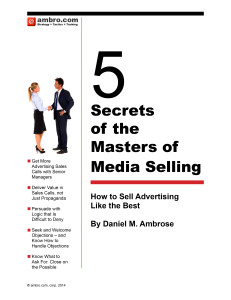Warren Buffett famously said “price is why you pay, value is what you get.” This is a good thing to keep in mind when programmatic advertising buyers and sellers are considering their strategy and tactics.
When it comes to publisher-ad-sales strategy for programmatic, the objective is to realize the greatest portion of the “value” of an impression that the publisher can. For programmatic ad-buyers their goal is to pay the lowest price they can for a higher “value” impression. Let’s keep in mind that if the impression isn’t worth more than an advertiser pays, they wouldn’t buy it.
But how can an advertiser recognize a high-value impression that is available on an exchange, so it can bid for and win it? In an RTB environment, marketers may be using their own first-party data to help recognize and bid for impressions they know to be worth much more than the cost-bid. Since others don’t share that first-party knowledge, the advertiser has an advantage and is likely to win many bids far below the value they know the impression is worth.
 Unfortunately, most advertisers don’t have first party data on most of their market. They know their past customers, and they can recognize prospective customers in the RTB environment who have visited their site. But they need their ad campaign to reach far farther. Most advertisers try to solve this by using third-party data.
Unfortunately, most advertisers don’t have first party data on most of their market. They know their past customers, and they can recognize prospective customers in the RTB environment who have visited their site. But they need their ad campaign to reach far farther. Most advertisers try to solve this by using third-party data.
The trouble with third-party data is that it is available to their competitors, too. Consider, for example, two truck companies desiring to advertise to in-market shoppers. They can target truck shoppers by using third-party data from car-shopping sites like KBB and Cars.com. But their competitor has access to the third-party data, too. In short, third-party data may improve targeting, but it won’t improve competitive situation, since the price will be bid right up to the value of the impression.
That is where Private Market Place deals come in. Publishers negotiate PMPs with advertisers to better control which advertisers appear on their site and to offer those selected advertisers a private view of the worth of a particular impression. With private market place Deal-IDs, publisher-first-party data can be added to the Deal ID that enables a multiplicity of advertisers to see different, custom identified, characteristics of a buyer in the programmatic environment.
In the digital publishing world, ad-sales executives need to be able to collaborate with prospective advertisers to identify ways to gather and use publisher-first-party data that helps customers see the value to the impressions they might bid upon in the programmatic market. The ideal PMP is filled with Deal IDs that offer advertisers custom snapshots of the audience that they most want to see and bid on.
Is your ad-sales team trained and given the resources to add value for your advertising customers? Do they understand your Data Management Platform — what data it captures and what it offers to advertisers by innovative ways to target your customers? Are your sales team fearless enough to ask lots of questions? Does your sales team know how to ask smart questions that help identify opportunities?

